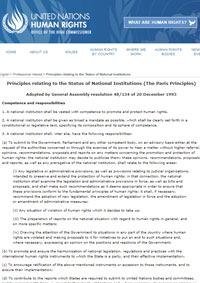
Paris Principles (resolution 48/134) are principles relating to the Status of National Human Rights Institutions. They were adopted by the General Assembly on 20th of December, 1993.
For more information please
visit the site
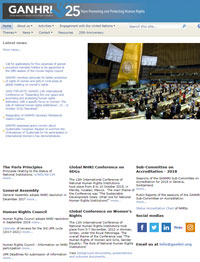
The International Coordinating Committee for National Human Rights Institutions (ICC) is the international association of national human rights institutions (NHRIs) from all parts of the globe, established in 1993. The Committee promotes and strengthens NHRIs to be in accordance with the Paris Principles and provides leadership in the promotion and protection of human rights.
The ICC:
- Facilitates and supports NHRI engagement with the UN Human Rights Council and Treaty Bodies
- Encourages cooperation and information-sharing among NHRIs, including through an annual meeting and biennial conference
- Undertakes accreditation of NHRIs in accordance with the Paris Principles
- Promotes the role of NHRIs within the United Nations and with States and other international agencies
- Offers capacity-building in collaboration with the Office of the High Commissioner for Human Rights (OHCR)
- Assists NHRIs under threat
- If requested, can assist governments to establish NHRIs
Regional NHRI Networks and Forums
- European Group of National Human Rights Institutions
- Asia Pacific Forum
- Network of African Human Rights Institutions
- Network of National Institutions for the Promotion and Protection of Human Rights in the Americas
- Commonwealth Forum of National Human Rights Institutions
- Arab-European Human Rights Dialogue
For more information please
visit the site
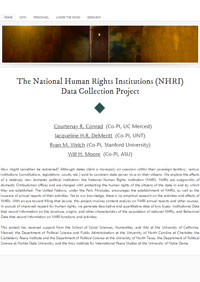
The Raoul Wallenberg Institute’s NHRI Database holds over 1 500 documents relating to National Human Rights Institutions. These documents are materials produced by NHRIs themselves (annual reports, thematic guides and studies, national inquiries, etc.) and UN documents, or scholarly articles related to National Human Rights Institutions. The objective of the Database is to make NHRI materials available to a wider audience and to generally promote the work of NHRIs around the world. The database also allows NHRIs to share best practices and for scholars and researchers to access relevant documents.
For more information please
visit the site
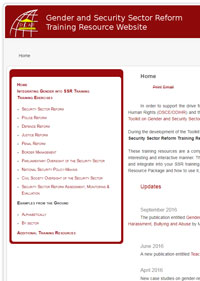
In order to support the drive for gender-responsive SSR, the Geneva Centre for the Democratic Control of Armed Forces (DCAF), the OSCE Office for Democratic Institutions and Human Rights (OSCE/ODIHR), and the United Nations International Research and Training Institution for the Advancement of Women (UN-INSTRAW, now part of UN Women) published a Toolkit on Gender and Security Sector Reform in February 2008.
These training resources are a companion to the SSR and Gender Toolkit. They are designed for SSR trainers and educators to help you present material on gender and SSR in an interesting and interactive manner. The Gender and SSR Training Resource Package contains a wide range of exercises, discussion topics, and examples from the ground that you can adapt and integrate into your SSR training. Gender trainers working with the security sector will also find the content useful.
For more information please
visit the site
.jpg)
The aim of ICOAF is to establish best practice and lessons learned related to the mandate, powers and functioning of these institutions. The initiative also reaches out to states that do not have an Ombuds institution for the military but have expressed an interest to learn from experiences from other states.
For more information please
visit the site
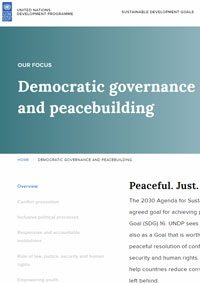
This is the UNDP web portal on democratic governance and peacebuilding. The portal contains information on key areas of UNDP’s rule of law and human rights work and provides tools and resources as well as useful links to other topics related to security sector governance.
For more information please
visit the site
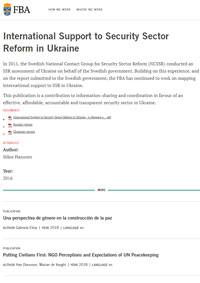
Folke Bernadotte Academy (FBA) is the Swedish government agency for peace, security and development. The Academy has the overall mission to support international peace and crisis management operations. In the area of Security Sector Reform, FBA offers:
- Policy, research and development
The FBA offers support to the work of the EU, UN and OSCE on SSR policy development. The FBA has developed a tool for SSR needs assessment and a handbook for SSR advisers. In addition, the FBA supports international research on SSR. - Training
The FBA offers a yearly SSR course as well as courses within the orbit of the European Security and Defence College. Furthermore, the FBA offers tailor-made SSR training on demand. - International work
The FBA seconds SSR experts to international peace missions. - Cooperation
The FBA coordinates a network of Swedish government agencies working on issues related to SSR. It also represents Sweden on the board of the International Security Sector Advisory Team (ISSAT).
For more information please
visit the site
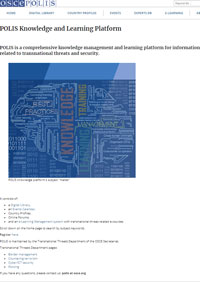
OSCE Polis is a digital library bringing together all aspects of international assistance in the areas of border security, counter terrorism, cyber security and policing, and wider law enforcement issues. OSCE Polis is a knowledge management tool created in response to the needs of the OSCE field operations staff involved in law enforcement activities and provides:
- Information resources — a repository of information on all policing-related activities previously or presently being undertaken in OSCE field operations. It identifies lessons learned, good practice and external sources of specialized knowledge;
- Experts Database — a database of international law enforcement experts available for short-term assignments, needs assessments, new mission start-up planning or inspections;
- Events Calendar — a section where all policing-related events, organized by the OSCE institutions and field operations are advertised, accompanied by relevant materials. The Events Calendar is closely interlinked with the Digital Library providing access to the related documents.
POLIS is an on-line resource centre for police and law enforcement officers, policy analysts, policy makers, evaluation experts, and donors in the field of policing and rule of law, helping them to plan reforms and access feedback on existing initiatives.
For more information please
visit the site
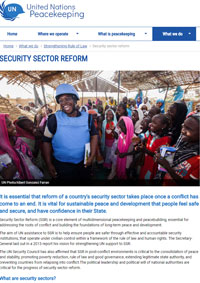
The United Nation’s Inter-Agency Task Force on Security Sector Reform (IASSRTF) brings together all UN agencies working on security sector governance issues. The Task Force was established by the Secretary-General of the United Nations in 2007 to promote an integrated, holistic and coherent United Nations security sector reform (SSR) approach that envisages assisting States and societies in establishing effective, inclusive and accountable security institutions so as to contribute to international peace and security, sustainable development and the enjoyment of human rights by all.
For more information please
visit the site
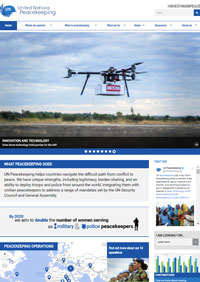
The Department of Peacekeeping Operations (DPKO) has been assisting in the reform of individual components of the security sector, such as police services, for decades.
Since 2007, DPKO has focused on supporting those efforts at the strategic level and in a holistic way, across all components.
DPKO’s Security Sector Reform Unit (SSRU), part of the Office of Rule of Law and Security Institutions, is the SSR focal point and technical capacity for the UN system as well as for national and international partners. The unit has responsibility for:
- providing political, strategic and technical assistance to peace operations involved in supporting national SSR efforts;
- supporting senior UN leaders to ensure SSR is integrated into the UN’s overall work;
- Acting as a global centre of excellence through the development of guidance and international norms;
- Developing SSR partnerships for the UN.
For more information please
visit the site
Page 2 of 7



